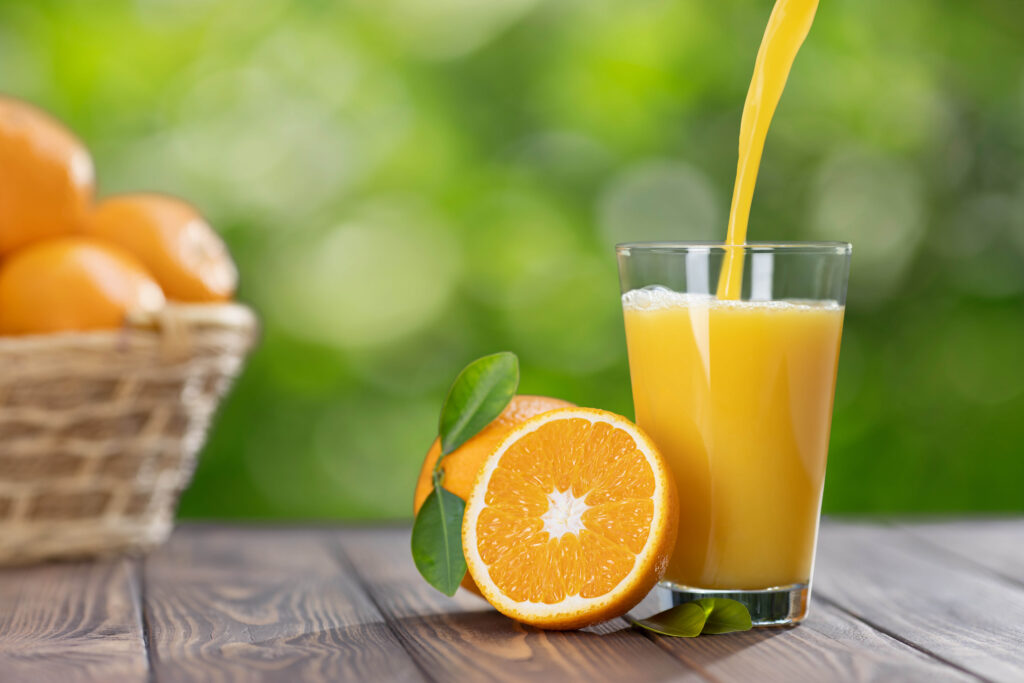Orange juice is more than just a delicious and refreshing drink—it’s a powerhouse of nutrients that can support your overall health.
Packed with vitamin C, antioxidants, and essential minerals, this bright and zesty beverage has been a breakfast staple for generations. But beyond its sweet, citrusy taste, orange juice offers a wide range of benefits, from strengthening immunity and improving heart health to enhancing skin radiance and supporting digestion.
Whether you prefer it freshly squeezed or store-bought, orange juice is an easy way to add valuable nutrients to your diet. But is it as healthy as it seems? And how much should you drink to maximize its benefits while avoiding potential downsides?
In this article, we’ll explore the numerous advantages of drinking orange juice and how it can contribute to your overall well-being.
Nutritional Value
Here is the nutritional value of one cup (240 ml) of freshly squeezed orange juice:
- Calories: 117 kcal
- Protein: 2 g
- Carbohydrates: 24.8 g
- Total Sugars: 20 g
- Magnesium: 25 mg (6% Daily Value (DV))
- Potassium: 454 mg (10% DV)
- Copper: 0.09 mg (10% DV)
- Vitamin C: 75.6 mg (84% DV)
- Thiamin (B1): 0.19 mg (16% DV)
- Riboflavin (B2): 0.1 mg (8% DV)
- Vitamin B6: 0.1 mg (6% DV)
- Folate: 72 mcg (18% DV)
Health Benefits
Below are the benefits offered by orange juice.
1. Loaded with Antioxidants
Orange juice is packed with powerful antioxidants like flavonoids, carotenoids, and ascorbic acid, which help protect cells from damage caused by free radicals.
These compounds reduce oxidative stress, inflammation, supporting overall health and reducing the risk of chronic conditions like diabetes, heart disease, and cancer etc,..
In a study, drinking 100% orange juice (750 mL daily for 8 weeks) has been found to improve cholesterol levels, reduce inflammation, and boost antioxidant activity in both normal and overweight individuals without affecting body weight. It also enhanced immune response, suggesting orange juice may help prevent metabolic and chronic diseases.
2. May Boost Immunity
Orange juice is a delicious way to give your immune system a natural boost!
Orange juice is packed with vitamin C and folate, both of which boost immunity by supporting immune cells like phagocytes, natural killer cells, T-cells and B-cells.
Vitamin C also supports immune function by acting as an antioxidant and regulating inflammation.
But that’s not all. It’s also loaded with flavonoids like hesperidin, narirutin, and naringin which fight inflammation and oxidative stress, keeping your immune system strong.
Want to strengthen your immune system? Discover the most nutritious foods that boost immunity here!
3. May Contribute to a Healthy Heart

Drinking orange juice in moderation can benefit heart health in several ways.
It contains potassium, and increased intake has been linked to a lower risk of high blood pressure, heart disease and stroke.
A meta-analysis of 19 trials with 618 adults found that fruit juice slightly reduced diastolic blood pressure by 2.07 mm Hg but had no significant effect on total cholesterol, LDL, HDL, or systolic blood pressure. However, cholesterol reduction was observed in those with lower polyphenol intake.
Similarly, a study on 129 adults found that drinking 2 cups (480 mL) of orange juice daily for at least a year was linked to lower total cholesterol, LDL, apo B, and LDL/HDL ratio. However, it did not affect HDL, body composition, or macronutrient intake.
Another review reported that while orange juice had no significant effect on triglycerides, total cholesterol, or HDL, drinking over 500 mL daily slightly reduced LDL cholesterol.
These mixed findings suggest that more research is needed to confirm its effects.
That said, orange juice is rich in flavonoids like hesperidin, which may improve blood vessel function, reduce inflammation and oxidative stress, and help lower cholesterol and blood pressure—all of which support a healthy heart.
4. Enhances Iron Absorption
Iron is a vital mineral that helps carry oxygen throughout the body. However, the type of iron found in plant-based foods (non-heme iron) is not as easily absorbed as the iron from animal sources.
The good news is that vitamin C significantly enhances the absorption of non-heme iron, making orange juice an excellent companion to iron-rich foods like spinach, lentils, and beans.
For individuals at risk of anemia—such as vegetarians, vegans, and menstruating women—pairing orange juice with iron-rich meals can help maintain healthy iron levels and prevent fatigue, weakness, and other deficiency symptoms.
5. May Help Reduce Inflammation
Orange juice may help lower inflammation thanks to its rich content of flavonoids like hesperidin, as well as vitamin C and folate. These compounds reduce oxidative stress, a key driver of chronic inflammation.
Chronic inflammation is linked to various health issues, including diabetes, heart disease, arthritis, and joint diseases. Orange juice contains bioactive compounds that may help lower inflammation markers in the body.
For instance, a study tested how commercial and fresh orange juice affect blood vessel health in 22 healthy adults. Both juices reduced inflammation markers (VCAM, hs-CRP, E-selectin) and increased apo A-1. Frsh orange juice also lowered LDL cholesterol. However, more research is needed to confirm long-term effects.
Apolipoprotein A-1 (apo A-1) is the main protein component of high-density lipoprotein (HDL), often called “good cholesterol”.
Studies show that drinking orange juice daily for several weeks can lower markers like CRP, IL-6, and vascular adhesion molecules, all of which contribute to inflammation and cardiovascular risk. Additionally, orange juice has been found to counteract post-meal inflammation caused by high-fat or high-carb meals.
Drinking a moderate amount of orange juice as part of an overall anti-inflammatory diet—rich in fruits, vegetables, and whole foods—can contribute to long-term health benefits.
6. May Prevent the Risk of Kidney Stones
Kidney stones are solid mineral deposits that form in the kidneys due to concentrated urine, potentially causing severe pain and urinary discomfort.
Orange juice may help prevent kidney stones by increasing urinary citrate levels, which bind to calcium ions, forming soluble citrate-calcium complexes. This reduces the availability of free calcium, which would otherwise combine with oxalate to form kidney stones.
Additionally, its alkalinizing effect raises urine pH, creating a less favorable environment for stone development.
In fact, orange juice offers stronger protection against kidney stones compared to other citrus juices like lemon and grapefruit.
However, moderation is key, as excessive intake may contribute to high sugar consumption.
7. May Boost Skin Health and Glow
The vitamin C and antioxidants in orange juice work wonders for skin health.
Vitamin C is essential for collagen production, which keeps skin firm, elastic, and youthful. Meanwhile, antioxidants help protect against damage from UV rays and environmental pollutants, reducing the risk of premature aging and its signs like wrinkles and fine lines.
Some people even apply orange juice topically as a natural toner, though drinking it regularly provides benefits from the inside out.
If you’re looking for a natural way to enhance your skin’s glow, a daily glass of orange juice can be a great addition to your routine.
8. May Improve Cognition

Flavonoids in orange juice have been linked to improved brain function and cognitive health.
For example, a study tested whether flavonoid-rich orange juice improves brain function in middle-aged men. Participants drank either flavonoid-rich orange juice or a placebo on separate days. Results showed that the juice boosted thinking skills, reaction speed, and alertness for up to six hours.
Additionally, drinking orange juice has been shown to reduce depression and improve mood.
In an 8-week study on young adults with major depressive disorder (MDD), participants consumed either flavonoid-rich orange juice or a low-flavonoid drink. Results showed that flavonoid-rich orange juice improved depression symptoms and enhanced key brain and gut health markers, suggesting potential benefits for MDD management.
These findings suggest that flavonoid-rich orange juice may support gut health, enhance cognitive function, and potentially aid in managing depression.
9. Keeps You Hydrated
Proper hydration is essential for nearly every bodily function, from maintaining energy levels to regulating body temperature. Orange juice is naturally hydrating, as it contains a high percentage of water (about 89%) along with important electrolytes like potassium and magnesium.
This makes it an excellent drink choice after exercise, during hot weather, or whenever you need a quick hydration boost.
However, since orange juice contains natural sugars, it’s best to balance it with plain water throughout the day.
10. Strengthens Bones with Calcium and Vitamin D
Orange juice fortified with calcium and vitamin D can be a valuable source of these essential nutrients, especially for those who don’t consume dairy products.
Calcium supports strong bones and teeth, while vitamin D enhances calcium absorption, reducing the risk of osteoporosis and fractures.
A single cup serving of orange juice provides 27% of the Daily Value of calcium and 12% of the daily recommended value for vitamin D.
However, calcium and vitamin D content of an orange juice varies by brand and level of fortification, always check the nutrition label to determine the exact amounts per serving.
If you’re lactose intolerant or prefer non-dairy options, fortified orange juice can help meet your daily calcium and vitamin D needs, promoting long-term bone health.

Fresh vs. Store-Bought Orange Juice: What’s Better?
Not all orange juice is created equal. Freshly squeezed orange juice retains the most nutrients, while store-bought varieties can vary in quality. Here’s what to look for:
- Best option: Freshly squeezed orange juice (maximizes nutrients and flavor)
- Good choice: 100% pure, not-from-concentrate orange juice (no added sugars or preservatives)
- Avoid: Orange juice with added sugars, artificial flavors, or preservatives
Reading labels carefully and choosing high-quality juice ensures you get the most health benefits.
It’s best to choose freshly prepared orange juice, as vitamin C is highly unstable and degrades over time. While storage reduces its content, refrigeration at 4°C helps slow down the loss.
How to Enjoy Orange Juice the Healthy Way
To make the most of orange juice without overdoing it, follow these tips:
- Drink in moderation – Limit to 4-8 ounces per day to avoid excess sugar.
- Pair with protein or healthy fats – Helps balance blood sugar levels.
- Choose juice with pulp – Contains more fiber and nutrients.
- Make your own fresh juice – Ensures purity and freshness.
Side Effects and Precautions
While orange juice offers many health benefits, it does have some downsides. Here are a few potential concerns to keep in mind:
Can Increase Blood Sugar Levels
Orange juice contains a high amount of natural sugars, which can cause blood sugar spikes, especially when consumed in large quantities. Unlike whole oranges, it lacks significant fiber, which helps slow down sugar absorption.
Along with natural sugars, many commercial orange juices have added sugars, which can cause blood sugar spikes and increase the risk of insulin resistance.
A review of studies examined whether fruit juice affects type 2 diabetes risk. Sugar-sweetened fruit juice increased diabetes risk by 28%, while 100% fruit juice had no significant effect. These findings support limiting sugary fruit juices to help prevent type 2 diabetes.
Always opt for freshly prepared orange juice and enjoy it in moderation (4-8 ounces per day) and pair it with fiber-rich foods to slow down sugar absorption.
Can Erode Tooth Enamel
Orange juice is acidic, which means frequent consumption can wear down tooth enamel over time, leading to increased sensitivity and cavities.
To minimize contact with teeth, it’s best to use straw and rinse your mouth with water after drinking. Also avoid brushing your teeth immediately after drinking acidic beverages.
Can Contribute to Weight Gain
Drinking orange juice can contribute to weight gain due to its high natural sugar content. Since orange juice is low in fiber, it may be less filling compared to whole oranges, which makes you eat more, potentially leading to weight gain over time.
However, drinking orange juice with meals may be better for weight control than consuming it between meals.
To prevent weight gain, enjoy orange juice in moderation, opt for fresh juice without added sugars, and balance it with fiber-rich foods or whole oranges.
Can Interfere with Certain Medications
Orange juice can interact with some medications, affecting their absorption and effectiveness. For example, it may interfere with certain blood pressure medications and statins (cholesterol-lowering drugs).
If you’re taking medications, check with your doctor to ensure that orange juice won’t interfere with them.
Takeaways
Orange juice is a delicious and nutritious drink that offers a wide range of health benefits. From boosting immunity and supporting heart health to enhancing digestion and promoting glowing skin, its nutrient-rich profile makes it a great addition to a healthy diet.
While moderation is key, choosing fresh or high-quality 100% juice can help you enjoy all the goodness this citrus fruit has to offer. So, the next time you pour yourself a glass, know that you’re fueling your body with essential vitamins, minerals, and antioxidants.
References:
- U.S. Department of Agriculture: FoodData Central
- Pruteanu LL, Bailey DS, Grădinaru AC, Jäntschi L. The Biochemistry and Effectiveness of Antioxidants in Food, Fruits, and Marine Algae. Antioxidants (Basel). 2023 Apr 2;12(4):860. doi: 10.3390/antiox12040860. PMID: 37107235; PMCID: PMC10135154.
- Grace K. Z. S. Dourado and Thais B. Cesar. Investigation of cytokines, oxidative stress, metabolic, and inflammatory biomarkers after orange juice consumption by normal and overweight subjects. Food & Nutrition Research 2015, 59: 28147 -http://dx.doi.org/10.3402/fnr.v59.28147.
- Miles EA, Calder PC. Effects of Citrus Fruit Juices and Their Bioactive Components on Inflammation and Immunity: A Narrative Review. Front Immunol. 2021 Jun 24;12:712608. doi: 10.3389/fimmu.2021.712608. PMID: 34249019; PMCID: PMC8264544.
- National Institutes of Health (NIH): Research Matters
- Liu K, Xing A, Chen K, Wang B, Zhou R, Chen S, Xu H, Mi M. Effect of fruit juice on cholesterol and blood pressure in adults: a meta-analysis of 19 randomized controlled trials. PLoS One. 2013 Apr 24;8(4):e61420. doi: 10.1371/journal.pone.0061420. PMID: 23637831; PMCID: PMC3634794.
- Aptekmann NP, Cesar TB. Long-term orange juice consumption is associated with low LDL-cholesterol and apolipoprotein B in normal and moderately hypercholesterolemic subjects. Lipids Health Dis. 2013 Aug 6;12:119. doi: 10.1186/1476-511X-12-119. PMID: 23919812; PMCID: PMC3750609.
- Amini MR, Sheikhhossein F, Bazshahi E, Rahimi H, Ghalandari H, Ghaedi E, Askarpour M. Orange juice intake and lipid profile: a systematic review and meta-analysis of randomised controlled trials. J Nutr Sci. 2023 Mar 17;12:e37. doi: 10.1017/jns.2023.22. PMID: 37008412; PMCID: PMC10052563.
- Mahmoud AM, Hernández Bautista RJ, Sandhu MA, Hussein OE. Beneficial Effects of Citrus Flavonoids on Cardiovascular and Metabolic Health. Oxid Med Cell Longev. 2019 Mar 10;2019:5484138. doi: 10.1155/2019/5484138. PMID: 30962863; PMCID: PMC6431442.
- National Institutes of Health (NIH): Office of Dietary Supplements Factsheet – Vitamin C and iron
- National Institutes of Health (NIH): StatPearls on Chronic Inflammation
- Asgary S, Keshvari M, Afshani MR, Amiri M, Laher I, Javanmard SH. Effect of fresh orange juice intake on physiological characteristics in healthy volunteers. ISRN Nutr. 2014 Mar 4;2014:405867. doi: 10.1155/2014/405867. PMID: 24967267; PMCID: PMC4045306.
- Barghouthy Y, Somani BK. Role of Citrus Fruit Juices in Prevention of Kidney Stone Disease (KSD): A Narrative Review. Nutrients. 2021 Nov 17;13(11):4117. doi: 10.3390/nu13114117. PMID: 34836376; PMCID: PMC8625077.
- Pullar JM, Carr AC, Vissers MCM. The Roles of Vitamin C in Skin Health. Nutrients. 2017 Aug 12;9(8):866. doi: 10.3390/nu9080866. PMID: 28805671; PMCID: PMC5579659.
- Alharbi MH, Lamport DJ, Dodd GF, Saunders C, Harkness L, Butler LT, Spencer JP. Flavonoid-rich orange juice is associated with acute improvements in cognitive function in healthy middle-aged males. Eur J Nutr. 2016 Sep;55(6):2021-9. doi: 10.1007/s00394-015-1016-9. Epub 2015 Aug 18. PMID: 26280945; PMCID: PMC5009163.
- Choi J, Kim JH, Park M, Lee HJ. lEffects of Flavonoid-Rich Orange Juice Intervention on Major Depressive Disorder in Young Adults: A Randomized Controlled Trial. Nutrients. 2022 Dec 28;15(1):145. doi: 10.3390/nu15010145. PMID: 36615801; PMCID: PMC9823945.
- National Institutes of Health (NIH): Office of Dietary Supplements Factsheet – Calcium and Vitamin D
- Martins, R.C.; Leonel, S.; Souza, J.M.A.; Lima, G.P.P.; Leonel, M.; Putti, F.F.; Monteiro, G.C.; Züge, P.G.Ü.; Napoleão, G.M.; Figueira, R.; et al. Profile of Bioactive Compounds in Orange Juice Related to the Combination of Different Scion/Rootstocks, Packaging and Storage. Horticulturae 2023, 9, 347. https://doi.org/10.3390/horticulturae9030347.
- National Institutes of Health (NIH): StatPearls – High Fiber Diet
- Xi B, Li S, Liu Z, Tian H, Yin X, Huai P, Tang W, Zhou D, Steffen LM. Intake of fruit juice and incidence of type 2 diabetes: a systematic review and meta-analysis. PLoS One. 2014 Mar 28;9(3):e93471. doi: 10.1371/journal.pone.0093471. PMID: 24682091; PMCID: PMC3969361.
- Wikipedia article “Dental erosion”, available under the CC BY-SA 4.0. You can view the full version and its edit history here.
- Hägele, F.A., Büsing, F., Nas, A. et al. High orange juice consumption with or in-between three meals a day differently affects energy balance in healthy subjects. Nutr & Diabetes 8, 19 (2018). https://doi.org/10.1038/s41387-018-0031-3.
Note: Most of the references above are used under open-access licenses CC BY 2.0, CC BY 3.0, and


